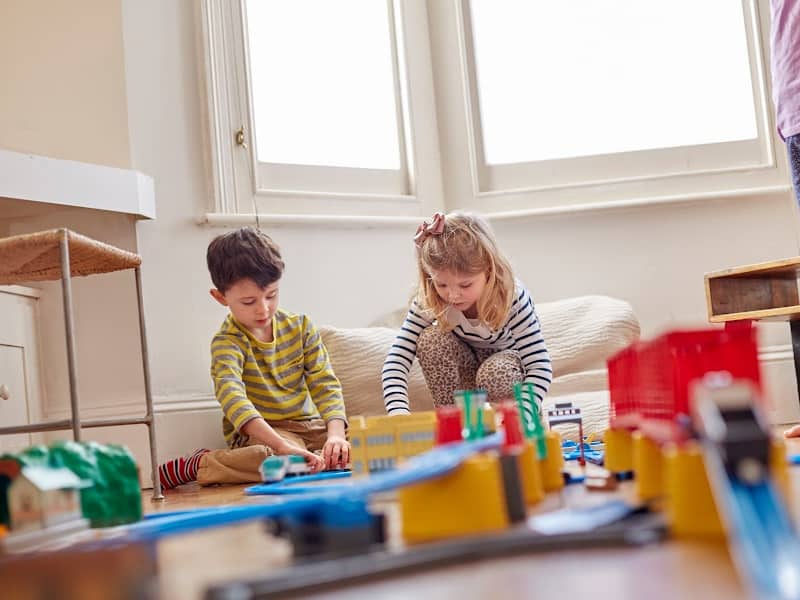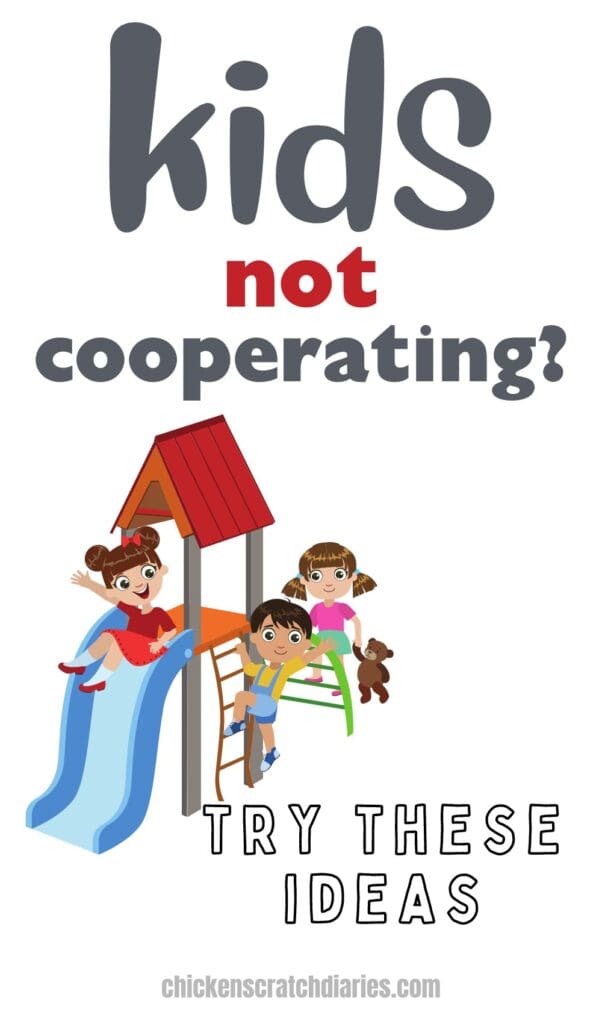
Most parents struggle with getting kids to cooperate– with us, with siblings and others. Below are four things to think about when addressing the issue of cooperation for kids.
If we took a poll on how many parents want to know how to get kids to cooperate, I could only imagine the overwhelming response.
Whether at home, in church, or at the grocery store, there are times we need kids to not just obey us –
-but to understand the importance of cooperating and working together as a team.
What cooperation boils down to, in my mind, is teaching kids that we shouldn’t only act according to our immediate wants and needs, but to think of others as well.
Cooperation helps us to reach common goals; it helps us to put aside our selfishness and see things from another angle.
It builds strong relationships because, let’s face it – we can’t always have things our way, and we can’t do everything alone.

Realizing the value of cooperation is the hard part.
That’s because this internal struggle of “I’ll do it my way” is what has to be dealt with and understood.
At the same time, we hope our kids will want to cooperate for the right people, at the right time, and in the right way.
This post likely contains affiliate links. Please see our disclosure for more info.
4 Simple tips for teaching kids cooperation skills
Let’s look at some ways of teaching kids to cooperate that will benefit them throughout their lives.
1| Focus on relationship
This is the key thing with really any value I want to “stick” with my kids.
The lesson is only as powerful as the strength of our relationship.
In other words, if we want to teach our kids something, we have to do things like:
- Believe that it’s important and act accordingly (consistency)
- Model the behavior/skill for them
- Gently correct and guide
- Acknowledge growth
As Josh McDowell says, “Rules without relationship lead to rebellion.” That quote has stuck with me for years.
And in fact, every time I’m flustered by my kids’ uncooperative behavior, I’m forced to examine our relationship.
Have I been attentive to my child’s needs lately? Have I paid close attention to something that might be upsetting them?
Often, there is something lacking in our relationship that might have fueled the uncooperative spirit.
2| Look for teamwork opportunities
Obviously, if your child has siblings, there are ample opportunities to work together as a team.
Sometimes it may seem easier to just assign each child to a task and avoid the inevitable fights that ensue.
(Or maybe I’m the only one.)
However, try it and see what happens when your kids work together on:
- Household chores
- Taking care of animals
- Making meals
- Planning fun events
Yes, there might be fights, especially if they’re not used to teamwork being required.
You might be surprised, though, how much they learn from simple, collaborative work.

Having to come up with plans together and learning each other’s strengths builds camaraderie, gives them a sense of ownership and shows them what can be accomplished together.
And although I tend to champion not overscheduling kids, team sports can have an important value in teaching cooperation.
That’s not to say this lesson is readily learned by everyone on the team. But it’s still the point.
From the star player to the water carrier, every person is needed to do their best and carry out their role in order to move the team forward.
On a good team with good leadership, kids can find plenty of opportunities to build cooperation skills.
3| Pause for dramatic effect
So often, I neglect to emphasize the importance of cooperation in our daily family life.
And when my kids are cooperating, I often fail to acknowledge this small miracle.
The next time your kids are trying to do something together: play a game, decide on where to eat for dinner, or pick out a movie to watch –
-take a moment to pause and talk through their cooperative effort.
Is one kid making the task impossible by stubbornly insisting on his way or the highway?
Hit the “pause” button and ask him what’s more important, getting what he wants or being a part of the team.
Help him to understand that it may not be his ideal choice, but sometimes we get our way and sometimes we have to “get along”.
On the flip side, the next time your kids are working on a project and showing cooperation, pause and make a big deal of it.
Did they help each other with chores so they would get done faster?
High fives are in order.
Don’t miss the celebration – and the chance for reinforcement.
4| Let them get bored
Our kids are growing up in a very individualistic world.
From personal devices they’re plugged into to screens in almost every room, headphones in every ear… it’s hard to encourage together-ness, it seems.
With so much technology and just stuff in general, kids rarely have a chance to be bored.
Boredom leads to curiosity, creativity, and problem-solving.
And a lot of the time, this involves finding someone else to create with.

Finding times during the day to unplug as a family can make cooperation a lot more appealing.
Give them a purpose during their unplugged-time, and that’s even better.
Here’s a list of activities kids of all ages can do together.
Also consider cooperative games for kids such as:
Cooperation for Kids: Final Thoughts
Working through the examples of cooperation for kids outlined above is a good place to begin to encourage change.
Many times, just being intentional with accentuating the traits we hope to instill in our kids is the first and most important step.
I want to mention that in the real world, of course, there will be times when cooperation is not possible.
Friends or even authority figures might attempt to get our kids to “cooperate” with requests that are inappropriate or outright harmful.
Understanding boundaries is critical, not just on the issue of cooperation but in life in general.
Knowing who they can trust and should cooperate with, and what situations warrant judgment and discernment are ongoing conversations we must have with our kids.
The goal is raising smart, capable kids after all; not mindless compliant robots.
Kids are unique and some will naturally be more cooperative than others.
However, by encouraging cooperation in meaningful ways throughout the day, we can (God willing) help foster a habit that will serve them far into the future.
Related products:
Raising Responsible Kids (Ebook + printables)
Strategies for Defiant Behavior (Ebook + Scripture printables)
You might also like:
Limiting screen time (realistic tips)
Sibling Rivalry and the Road to Brotherly Love
35 Best Books on Values for Kids

